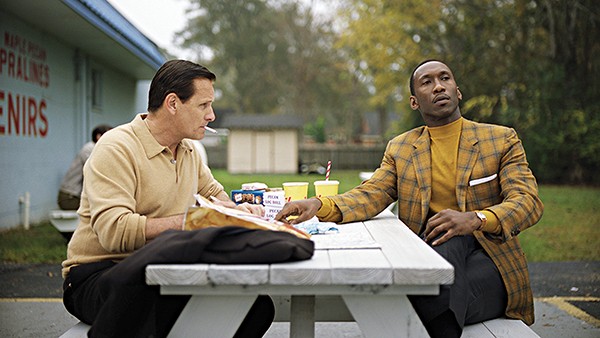Here’s a conundrum for you: How do you make a person less racist?
Screaming “You’re racist!” at them doesn’t seem to help. But there’s one thing that does seem to help reduce hatred and bigotry of all kind: exposure. The more people you meet who are different from you, the less likely you are to hate them for the color of their skin or their language or religion or sexual orientation or whatever. Travel, in other words, helps bring us together.
That’s more or less the theme of Green Book. It’s 1962 in New York City, and Tony Lip (Viggo Mortensen) has a pretty good gig as a bouncer (“I’m in public relations”) at the legendary Copacabana night club. It’s a beautiful and elegant place populated by the rich and famous — and also a bunch of mobsters. That means Tony has to occasionally mix it up it with a well-heeled but rowdy Italian guy in order to keep the peace. But after an incident with a don’s hat goes a little sideways, the club gets shut down for the last two months of the year, so Tony’s got to find a new job.

Viggo Mortensen (left) and Mahershala Ali take to the road in Peter Farrelly’s Green Book.
He makes a few bucks betting fat guys he can eat more hot dogs than they can, but with the holidays coming up, underground competitive eating contests aren’t going to cut it. Then he gets a job interview with a doctor who needs a driver.
Dr. Don Shirley (Mahershala Ali) couldn’t be more different than Tony, who has lived his whole life in the same Bronx neighborhood where his father and grandfather also lived. Dr. Shirley’s got three PhDs, none of which are in medicine.
“He’s a doctor of piano playing,” Tony says later.
“Can you be that?” asks his wife Dolores (Linda Cardellini).
Yes, you can. But it was not common in 1963 for a black man to have a PhD in the arts; to have studied in Russia, Germany, and Italy; or to have a comfortable career playing his own neoclassical jazz compositions for the rich and powerful. Dr. Shirley needs a driver because he’s embarking on a two-month tour, where he and his trio will play both cavernous concert halls and intimate chamber recitals. The catch is, the tour will swing through the deep South, and Dr. Shirley knows at some point there’s going to be the kind of trouble where a beefy, mobbed-up Italian from the Bronx is going to come in handy. After some negotiation, Dr. Shirley meets Tony’s price, and they’re off. But not before Tony is forced to become acquainted with the Green Book, a publication from the Jim Crow era that listed black-friendly hospitality establishments all through the segregated South. Once they’re on the road, however, the odd couple will discover that just sticking to the book is not enough to avoid bigotry, discrimination, and outright violence.
The obvious and easy comparison for Green Book is Driving Miss Daisy, only with a white guy behind the wheel and a black guy playing the part of the patrician passenger. In practice, however, it’s not that simple. Directed by Peter Farrelly, half of the Farrelly Brothers, who brought us such carefully crafted social experiments as There’s Something About Mary and Dumb and Dumber, this film is not precious or preachy — or at least, not too preachy.
For much of its length, it’s basically a two-hander set in a tail-finned blue Thunderbird traveling on the then-new Interstate system and on the back roads of Kentucky, North Carolina, Tennessee, Louisiana, Georgia, and finally, Alabama. The chemistry between Mortensen and Ali is critical, and the two actors spend the film elevating and occasionally transcending the material they’re given to work with. Mortensen grew a totally authentic gut for the production, and he and Farrelly can’t stop throwing food gags into the mix. (The best is when Tony eats a whole pizza like he’s hoisting a slice on the street.) Ali is all about dignity, his performance recalling Ellis Haizlip, the effortlessly classy TV host profiled in the documentary Mr. Soul!, who, like Dr. Shirley, was a gay man who found an accepting home in the New York of the ’60s. The juxtaposition of class (Tony is poor, Dr. Shirley is wealthy) and race (as an Italian Yankee, Tony is only slightly more accepted than Dr. Shirley in the hierarchy of Southern society) make for the film’s most interesting moments. But if you’re looking for a piercing critique of race and class, seek out Sorry to Bother You instead. Green Book is well-meaning and competently made, but anodyne and ultimately ephemeral entertainment.